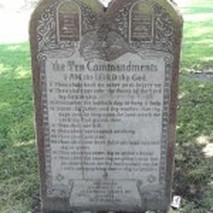
Matthew 5:17-19 (NKJV)17 "Do not think that I came to destroy the Law or the Prophets. I did not come to destroy but to fulfill.18 For assuredly, I say to you, till heaven and earth pass away, one jot or one tittle will by no means pass from the law till all is fulfilled.19 Whoever therefore breaks one of the least of these commandments, and teaches men so, shall be called least in the kingdom of heaven; but whoever does and teaches them, he shall be called great in the kingdom of heaven.
What did He mean?
Some people think that since He came to, and did, fulfill “The Law” that “The Law” no longer applies to Christians.
If that is the case then let me ask a few questions;
- Is it alright to worship other gods, because Jesus kept the First Commandment?
- Is it alright to have religious images as part of our worship, because Jesus kept the Second Commandment?
- Is it permissible to take God’s name in vain, because Jesus kept the Third Commandment?
- Can one break the Sabbath—the Fourth Commandment—because Jesus kept it?
- Because Jesus honored His parents—the Fifth Commandment—are believers permitted to dishonor their parents?
- Since Jesus did not murder, commit sexual sins, steal, lie or covet anything that belonged to others, are Christians free of any obligation to keep the Sixth, Seventh, Eighth, Ninth and 10th Commandments?
We know the answers to these questions. Yes these things still apply to us today. Yet Jesus said that He came to fulfill “The Law” and His last words on the cross were “It is finished”, meaning all that He came to do while on earth was complete and, we can assume that included fulfilling “The Law”.
John 19:30 (HCSB)30 When Jesus had received the sour wine, He said, “It is finished!” Then bowing His head, He gave up His spirit.
Let me clear up the confusion.
The first thing we need to do is to determine is, when Jesus referred to “The Law” what He was talking about. Was it the Ten Commandments found in Exodus 20:1-17?
- You shall have no other gods before Me
- You shall not make for yourself a carved image
- You shall not take the name of the LORD your God in vain
- Remember the Sabbath day, to keep it holy
- Honor your father and your mother
- You shall not murder
- You shall not commit adultery
- You shall not steal
- You shall not bear false witness
- You shall not covet
The “Sermon on the Mount” comprises the entire fifth chapter of Matthew and in it Jesus referrers to and extends to statements from the Law but only two of them are from the Ten Commandments.
Matthew 5:21 (HCSB) “You have heard that it was said to our ancestors, Do not murder, and whoever murders will be subject to judgment.
Matthew 5:27 (HCSB) “You have heard that it was said, Do not commit adultery.
The other topics Jesus covered—divorce, oaths, revenge, and hatred—are taken from other places elsewhere in the Old Testament.
Deuteronomy 24:1 (HCSB) “If a man marries a woman, but she becomes displeasing to him because he finds something improper about her, he may write her a divorce certificate, hand it to her, and send her away from his house.
Numbers 30:2 (HCSB) When a man makes a vow to the LORD or swears an oath to put himself under an obligation, he must not break his word; he must do whatever he has promised.
Deuteronomy 19:21 (HCSB) You must not show pity: life for life, eye for eye, tooth for tooth, hand for hand, and foot for foot.
Leviticus 19:18 (HCSB) Do not take revenge or bear a grudge against members of your community, but love your neighbor as yourself; I am Yahweh.
When He said “The Law” and the Prophets that would indicate that He was talking about more than the Ten Commandments, and the first five books, of what we now know as the Bible. In another place He includes even more;
Luke 24:44 (HCSB) Then He told them, “These are My words that I spoke to you while I was still with you—that everything written about Me in the Law of Moses, the Prophets, and the Psalms must be fulfilled.”

The Hebrew word for law is Torah. It’s really God’s instructions for living and not only legal regulation. It is often understood to mean the first five books of the bible, (in some cases includes the entire Old Testament) and before and during Jesus’ days on the earth and even among Jewish people today, the rabbis make it their goal to understand and teach these instructions fully.
The Old Testament, is the Scripture used by the Jews in Jesus’ day. It was generally divided into three sections The Pentateuch (the first five books of the Old Testament), History (Joshua, Judges, Ruth, 1st and 2nd Samuel, 1st and 2nd Kings, 1st and 2nd Chronicles, Ezra, Nehemiah, and Esther), Poetry or Writings (Job, Psalms, Proverbs, Ecclesiastes, and Song of Solomon), and Prophets (Isaiah, Jeremiah, Lamentations, Ezekiel, Daniel, Hosea, Joel, Amos, Obadiah, Jonah, Micah, Nahum, Habakkuk, Zephaniah, Haggai, Zechariah, and Malachi).
Jesus was, in effect, saying that He came to fulfil everything written in what we know as the Old Testament that pointed to Him.
How did Jesus Fulfill the Law?
Remember the Scripture at the beginning of the post says that Jesus didn’t come to abolish but to fulfill “The Law” which we have now determined to be the Hebrew Scriptures or Torah. Jesus loved and obeyed “The Law”. He fulfilled all the prophecies about Himself as the Messiah, He fulfilled the demands of the Mosaic law as codified in The Pentateuch, which called for perfect obedience.
The Greek word pleroo is translated “fulfill” in Matthew 5:17. Strong’s defines pleroo;
“to make replete, i.e. (literal) to cram (a net), level up (a hollow), or (figurative) to furnish (or imbue, diffuse, influence), satisfy, execute (an office), finish (a period or task), verify (or coincide with a prediction), etc. :- accomplish, × after, (be) complete, end, expire, fill (up), fulfil, (be, make) full (come), fully preach, perfect, supply.”
To fulfill can mean to complete or accomplish, but it can also mean to fill to the full. Taken in context, when Jesus said that He did not come to abolish but to fulfill, His intent is clear. Jesus came to fulfill the true meaning and purpose of what the Law was all about.
Where the Law said do not lie, do not steal, do not commit adultery (Exodus 20:1-17), etc., Jesus obeyed the moral law perfectly.
He never sinned.
1 Peter 2:21-22 (HCSB)21 For you were called to this, because Christ also suffered for you, leaving you an example, so that you should follow in His steps.22 He did not commit sin, and no deceit was found in His mouth;
He satisfied the sacrificial requirement of the shedding of blood for forgiveness of sins.
Hebrews 9:12 (HCSB)12 He entered the most holy place once for all, not by the blood of goats and calves, but by His own blood, having obtained eternal redemption.
He fulfilled the prophecies about the coming of the Messiah.
Isaiah 7:14 (HCSB)14 Therefore, the Lord Himself will give you a sign: The virgin will conceive, have a son, and name him Immanuel.
He was the prophet Moses talked about.
Deuteronomy 18:18 (HCSB)18 I will raise up for them a prophet like you from among their brothers. I will put My words in his mouth, and he will tell them everything I command him.
He's our priest.
Psalm 110:4 (HCSB)4 The LORD has sworn an oath and will not take it back: “Forever, You are a priest like Melchizedek.”
He was crucified.
Psalm 22:1 (HCSB) My God, my God, why have You forsaken me? ⌊Why are You⌋ so far from my deliverance and from my words of groaning?
He was rose from the dead.
Psalm 16:10 (HCSB)10 For You will not abandon me to Sheol; You will not allow Your Faithful One to see decay.
Here is what Expositor’s Commentary on Matthew says about Matthew 5:17-19:
"The best interpretation of these difficult verses says that Jesus fulfills the Law and the Prophets in that they point to him, and he is their fulfillment. The antithesis is not between ‘abolish’ and ‘keep’ but between ‘abolish’ and ‘fulfill’" (page 143).

Psalm 19:7 (HCSB)7 The instruction of the LORD is perfect, renewing one’s life; the testimony of the LORD is trustworthy, making the inexperienced wise.
Till heaven and earth pass away, God's Law all of it—will continue to accomplish all that it was sent to do;
Isaiah 55:10-11 (HCSB)10 For just as rain and snow fall from heaven and do not return there without saturating the earth and making it germinate and sprout, and providing seed to sow and food to eat,11 so My word that comes from My mouth will not return to Me empty, but it will accomplish what I please and will prosper in what I send it ⌊to do⌋.”
You Can Fulfill “The Law” Too!!
We are saved by God's grace. Jesus honored “The Law” as God's Holy Word and declared the Law to be perfect, non-negotiable. The fulfillment of the Law is found in Christ Himself and His finished work of redemption.
Ephesians 2:8-9 (HCSB)8 For you are saved by grace through faith, and this is not from yourselves; it is God’s gift--9 not from works, so that no one can boast.
Romans 6:14 (HCSB)14 For sin will not rule over you, because you are not under law but under grace.
The Spirit gives us the ability to "love one another"
John 13:34-35 (HCSB)34 “I give you a new command: Love one another. Just as I have loved you, you must also love one another.35 By this all people will know that you are My disciples, if you have love for one another.”
When we love one another we have fulfilled “The Law”
Romans 13:8 (HCSB)8 Do not owe anyone anything, except to love one another, for the one who loves another has fulfilled the law.
Christians don’t work to fulfill the Pentateuch which Jesus fulfilled for us….we fulfill “The Law of Christ”
Galatians 6:2 (HCSB)2 Carry one another’s burdens; in this way you will fulfill the law of Christ.
Jesus, through His life and teaching, magnified “The Law”. His perfect example give full meaning to “The Law”. Jesus live and example emphasized the principle underlying “The Law”, the principle of love. That’s how He could respond to the young ruler;
Matthew 22:34-40 (HCSB)34 When the Pharisees heard that He had silenced the Sadducees, they came together.35 And one of them, an expert in the law, asked a question to test Him:36 “Teacher, which command in the law is the greatest?”37 He said to him, “Love the Lord your God with all your heart, with all your soul, and with all your mind.38 This is the greatest and most important command.39 The second is like it: Love your neighbor as yourself.40 All the Law and the Prophets depend on these two commands.”

 RSS Feed
RSS Feed